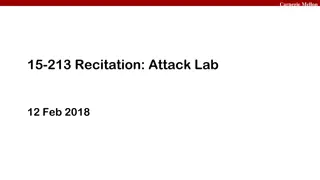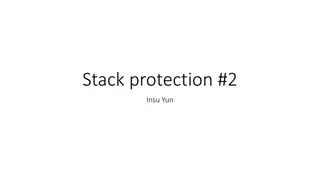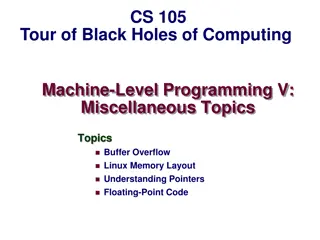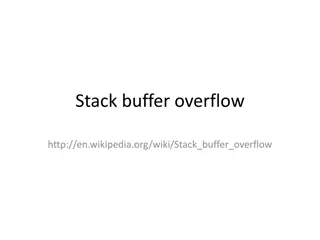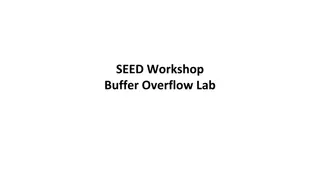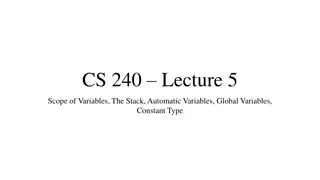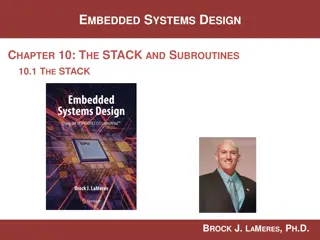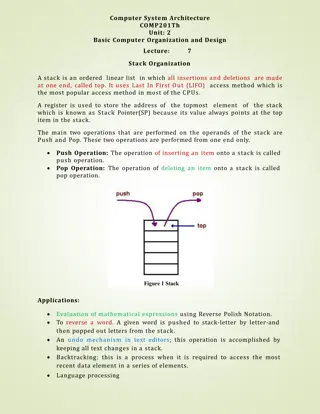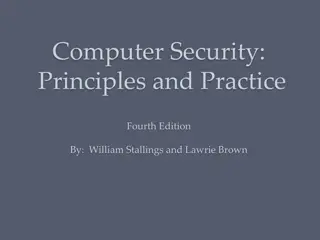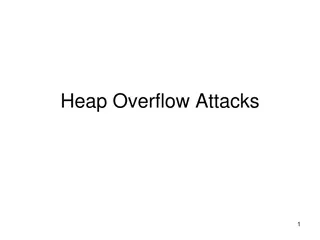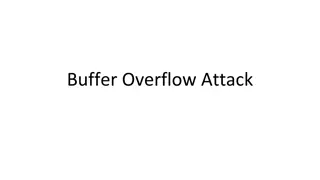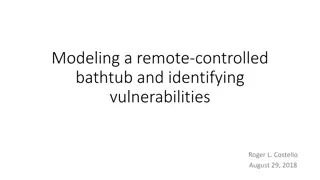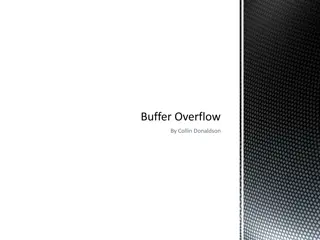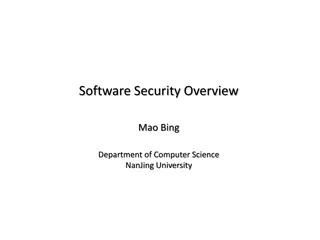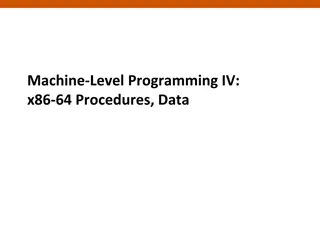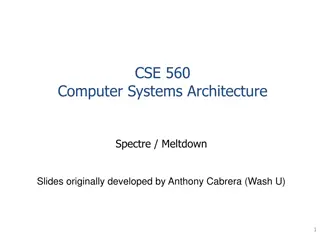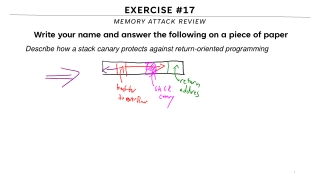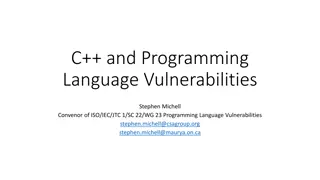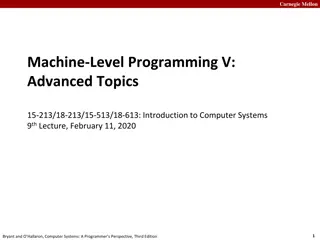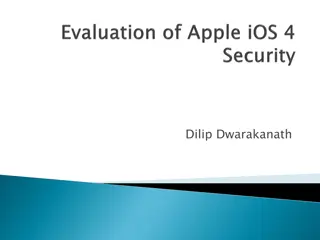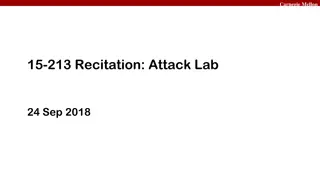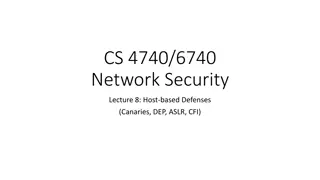Understanding Stack Overflow Vulnerabilities and Exploitation Techniques
Explore the history of stack overflow vulnerabilities, learn how to control a PC using stack overflow, place shellcode in memory, calculate shellcode addresses, and execute shellcode. Understand different types of overflows including stack overflow, heap overflow, and integer overflow. Delve into the Morris worm incident, prevalent stack overflow issues today, and review code snippets for vulnerability analysis and exploitation.
Download Presentation

Please find below an Image/Link to download the presentation.
The content on the website is provided AS IS for your information and personal use only. It may not be sold, licensed, or shared on other websites without obtaining consent from the author. Download presentation by click this link. If you encounter any issues during the download, it is possible that the publisher has removed the file from their server.
E N D
Presentation Transcript
Stack overflow Insu Yun
Objectives Understand what the stack overflow is Understand how to control PC using stack overflow Understand how to place shellcode in memory Understand how to calculate shellcode address and to launch a shell
Overflow Flow over boundary (i.e., over capacity) Many overflows in software security Stack overflow (Today) Heap overflow (lab09) Integer overflow (lab08)
Stack overflow: History 1988: Morris worm The first internet worm (i.e., malware distributed by internet) Developed by Robert Morris (a professor at MIT) to measure internet size But his worm had a mistake (as always) and crashes several problems He used multiple vulnerabilities including stack overflow in fingerd 2020: Still prevalent, but more difficult to exploit thanks to stack protection, which we will explore next week
Review ; vuln 0x08048426 <+0>: push ebp 0x08048427 <+1>: mov ebp,esp 0x08048429 <+3>: sub esp,0x10 0x0804842c <+6>: push DWORD PTR [ebp+0x8] 0x0804842f <+9>: lea eax,[ebp-0x10] 0x08048432 <+12>: push eax 0x08048433 <+13>: call 0x80482e0 <strcpy@plt> 0x08048438 <+18>: add esp,0x8 0x0804843b <+21>: nop 0x0804843c <+22>: leave 0x0804843d <+23>: ret void vuln(char *src) { char buf[16]; strcpy(buf, src); } int main(int argc, char *argv[]) { vuln(argv[1]); } ; main 0x0804843e <+0>: push ebp 0x0804843f <+1>: mov ebp,esp 0x08048441 <+3>: mov eax,DWORD PTR [ebp+0xc] 0x08048444 <+6>: add eax,0x4 0x08048447 <+9>: mov eax,DWORD PTR [eax] 0x08048449 <+11>: push eax 0x0804844a <+12>: call 0x8048426 <vuln> 0x0804844f <+17>: add esp,0x4 0x08048452 <+20>: mov eax,0x0 0x08048457 <+25>: leave 0x08048458 <+26>: ret unusal-main in this lab Disable stack protection lab04 gcc -z execstack -fno-stack-protector fno-pic -no-pie -mpreferred-stack-boundary=2 -m32 -O0 -o vuln vuln.c Disable Program Independent Executable(PIE) lab05 Disable stack alignment
envp ; vuln 0x08048426 <+0>: push ebp 0x08048427 <+1>: mov ebp,esp 0x08048429 <+3>: sub esp,0x10 0x0804842c <+6>: push DWORD PTR [ebp+0x8] 0x0804842f <+9>: lea eax,[ebp-0x10] 0x08048432 <+12>: push eax 0x08048433 <+13>: call 0x80482e0 <strcpy@plt> 0x08048438 <+18>: add esp,0x8 0x0804843b <+21>: nop 0x0804843c <+22>: leave 0x0804843d <+23>: ret argv argc main s return address esp eip ; main 0x0804843e <+0>: push ebp 0x0804843f <+1>: mov ebp,esp 0x08048441 <+3>: mov eax,DWORD PTR [ebp+0xc] 0x08048444 <+6>: add eax,0x4 0x08048447 <+9>: mov eax,DWORD PTR [eax] 0x08048449 <+11>: push eax 0x0804844a <+12>: call 0x8048426 <vuln> 0x0804844f <+17>: add esp,0x4 0x08048452 <+20>: mov eax,0x0 0x08048457 <+25>: leave 0x08048458 <+26>: ret
envp ; vuln 0x08048426 <+0>: push ebp 0x08048427 <+1>: mov ebp,esp 0x08048429 <+3>: sub esp,0x10 0x0804842c <+6>: push DWORD PTR [ebp+0x8] 0x0804842f <+9>: lea eax,[ebp-0x10] 0x08048432 <+12>: push eax 0x08048433 <+13>: call 0x80482e0 <strcpy@plt> 0x08048438 <+18>: add esp,0x8 0x0804843b <+21>: nop 0x0804843c <+22>: leave 0x0804843d <+23>: ret argv argc main s return address esp main s old ebp ; main 0x0804843e <+0>: push ebp 0x0804843f <+1>: mov ebp,esp 0x08048441 <+3>: mov eax,DWORD PTR [ebp+0xc] 0x08048444 <+6>: add eax,0x4 0x08048447 <+9>: mov eax,DWORD PTR [eax] 0x08048449 <+11>: push eax 0x0804844a <+12>: call 0x8048426 <vuln> 0x0804844f <+17>: add esp,0x4 0x08048452 <+20>: mov eax,0x0 0x08048457 <+25>: leave 0x08048458 <+26>: ret
envp ; vuln 0x08048426 <+0>: push ebp 0x08048427 <+1>: mov ebp,esp 0x08048429 <+3>: sub esp,0x10 0x0804842c <+6>: push DWORD PTR [ebp+0x8] 0x0804842f <+9>: lea eax,[ebp-0x10] 0x08048432 <+12>: push eax 0x08048433 <+13>: call 0x80482e0 <strcpy@plt> 0x08048438 <+18>: add esp,0x8 0x0804843b <+21>: nop 0x0804843c <+22>: leave 0x0804843d <+23>: ret argv argc main s return address ebp main s old ebp esp ; main 0x0804843e <+0>: push ebp 0x0804843f <+1>: mov ebp,esp 0x08048441 <+3>: mov eax,DWORD PTR [ebp+0xc] 0x08048444 <+6>: add eax,0x4 0x08048447 <+9>: mov eax,DWORD PTR [eax] 0x08048449 <+11>: push eax 0x0804844a <+12>: call 0x8048426 <vuln> 0x0804844f <+17>: add esp,0x4 0x08048452 <+20>: mov eax,0x0 0x08048457 <+25>: leave 0x08048458 <+26>: ret
envp ; vuln 0x08048426 <+0>: push ebp 0x08048427 <+1>: mov ebp,esp 0x08048429 <+3>: sub esp,0x10 0x0804842c <+6>: push DWORD PTR [ebp+0x8] 0x0804842f <+9>: lea eax,[ebp-0x10] 0x08048432 <+12>: push eax 0x08048433 <+13>: call 0x80482e0 <strcpy@plt> 0x08048438 <+18>: add esp,0x8 0x0804843b <+21>: nop 0x0804843c <+22>: leave 0x0804843d <+23>: ret argv argc main s return address ebp main s old ebp esp ; main 0x0804843e <+0>: push ebp 0x0804843f <+1>: mov ebp,esp 0x08048441 <+3>: mov eax,DWORD PTR [ebp+0xc] 0x08048444 <+6>: add eax,0x4 0x08048447 <+9>: mov eax,DWORD PTR [eax] 0x08048449 <+11>: push eax 0x0804844a <+12>: call 0x8048426 <vuln> 0x0804844f <+17>: add esp,0x4 0x08048452 <+20>: mov eax,0x0 0x08048457 <+25>: leave 0x08048458 <+26>: ret argv
envp ; vuln 0x08048426 <+0>: push ebp 0x08048427 <+1>: mov ebp,esp 0x08048429 <+3>: sub esp,0x10 0x0804842c <+6>: push DWORD PTR [ebp+0x8] 0x0804842f <+9>: lea eax,[ebp-0x10] 0x08048432 <+12>: push eax 0x08048433 <+13>: call 0x80482e0 <strcpy@plt> 0x08048438 <+18>: add esp,0x8 0x0804843b <+21>: nop 0x0804843c <+22>: leave 0x0804843d <+23>: ret argv argc main s return address ebp main s old ebp esp ; main 0x0804843e <+0>: push ebp 0x0804843f <+1>: mov ebp,esp 0x08048441 <+3>: mov eax,DWORD PTR [ebp+0xc] 0x08048444 <+6>: add eax,0x4 0x08048447 <+9>: mov eax,DWORD PTR [eax] 0x08048449 <+11>: push eax 0x0804844a <+12>: call 0x8048426 <vuln> 0x0804844f <+17>: add esp,0x4 0x08048452 <+20>: mov eax,0x0 0x08048457 <+25>: leave 0x08048458 <+26>: ret &argv[1]
envp ; vuln 0x08048426 <+0>: push ebp 0x08048427 <+1>: mov ebp,esp 0x08048429 <+3>: sub esp,0x10 0x0804842c <+6>: push DWORD PTR [ebp+0x8] 0x0804842f <+9>: lea eax,[ebp-0x10] 0x08048432 <+12>: push eax 0x08048433 <+13>: call 0x80482e0 <strcpy@plt> 0x08048438 <+18>: add esp,0x8 0x0804843b <+21>: nop 0x0804843c <+22>: leave 0x0804843d <+23>: ret argv argc main s return address ebp main s old ebp esp ; main 0x0804843e <+0>: push ebp 0x0804843f <+1>: mov ebp,esp 0x08048441 <+3>: mov eax,DWORD PTR [ebp+0xc] 0x08048444 <+6>: add eax,0x4 0x08048447 <+9>: mov eax,DWORD PTR [eax] 0x08048449 <+11>: push eax 0x0804844a <+12>: call 0x8048426 <vuln> 0x0804844f <+17>: add esp,0x4 0x08048452 <+20>: mov eax,0x0 0x08048457 <+25>: leave 0x08048458 <+26>: ret argv[1]
envp ; vuln 0x08048426 <+0>: push ebp 0x08048427 <+1>: mov ebp,esp 0x08048429 <+3>: sub esp,0x10 0x0804842c <+6>: push DWORD PTR [ebp+0x8] 0x0804842f <+9>: lea eax,[ebp-0x10] 0x08048432 <+12>: push eax 0x08048433 <+13>: call 0x80482e0 <strcpy@plt> 0x08048438 <+18>: add esp,0x8 0x0804843b <+21>: nop 0x0804843c <+22>: leave 0x0804843d <+23>: ret argv argc main s return address ebp main s old ebp argv[1] esp ; main 0x0804843e <+0>: push ebp 0x0804843f <+1>: mov ebp,esp 0x08048441 <+3>: mov eax,DWORD PTR [ebp+0xc] 0x08048444 <+6>: add eax,0x4 0x08048447 <+9>: mov eax,DWORD PTR [eax] 0x08048449 <+11>: push eax 0x0804844a <+12>: call 0x8048426 <vuln> 0x0804844f <+17>: add esp,0x4 0x08048452 <+20>: mov eax,0x0 0x08048457 <+25>: leave 0x08048458 <+26>: ret
envp ; vuln 0x08048426 <+0>: push ebp 0x08048427 <+1>: mov ebp,esp 0x08048429 <+3>: sub esp,0x10 0x0804842c <+6>: push DWORD PTR [ebp+0x8] 0x0804842f <+9>: lea eax,[ebp-0x10] 0x08048432 <+12>: push eax 0x08048433 <+13>: call 0x80482e0 <strcpy@plt> 0x08048438 <+18>: add esp,0x8 0x0804843b <+21>: nop 0x0804843c <+22>: leave 0x0804843d <+23>: ret argv argc main s return address ebp main s old ebp argv[1] ; main 0x0804843e <+0>: push ebp 0x0804843f <+1>: mov ebp,esp 0x08048441 <+3>: mov eax,DWORD PTR [ebp+0xc] 0x08048444 <+6>: add eax,0x4 0x08048447 <+9>: mov eax,DWORD PTR [eax] 0x08048449 <+11>: push eax 0x0804844a <+12>: call 0x8048426 <vuln> 0x0804844f <+17>: add esp,0x4 0x08048452 <+20>: mov eax,0x0 0x08048457 <+25>: leave 0x08048458 <+26>: ret vuln s return address esp
envp ; vuln 0x08048426 <+0>: push ebp 0x08048427 <+1>: mov ebp,esp 0x08048429 <+3>: sub esp,0x10 0x0804842c <+6>: push DWORD PTR [ebp+0x8] 0x0804842f <+9>: lea eax,[ebp-0x10] 0x08048432 <+12>: push eax 0x08048433 <+13>: call 0x80482e0 <strcpy@plt> 0x08048438 <+18>: add esp,0x8 0x0804843b <+21>: nop 0x0804843c <+22>: leave 0x0804843d <+23>: ret argv argc main s return address ebp main s old ebp argv[1] ; main 0x0804843e <+0>: push ebp 0x0804843f <+1>: mov ebp,esp 0x08048441 <+3>: mov eax,DWORD PTR [ebp+0xc] 0x08048444 <+6>: add eax,0x4 0x08048447 <+9>: mov eax,DWORD PTR [eax] 0x08048449 <+11>: push eax 0x0804844a <+12>: call 0x8048426 <vuln> 0x0804844f <+17>: add esp,0x4 0x08048452 <+20>: mov eax,0x0 0x08048457 <+25>: leave 0x08048458 <+26>: ret vuln s return address esp vuln s old ebp
envp ; vuln 0x08048426 <+0>: push ebp 0x08048427 <+1>: mov ebp,esp 0x08048429 <+3>: sub esp,0x10 0x0804842c <+6>: push DWORD PTR [ebp+0x8] 0x0804842f <+9>: lea eax,[ebp-0x10] 0x08048432 <+12>: push eax 0x08048433 <+13>: call 0x80482e0 <strcpy@plt> 0x08048438 <+18>: add esp,0x8 0x0804843b <+21>: nop 0x0804843c <+22>: leave 0x0804843d <+23>: ret argv argc main s return address main s old ebp argv[1] ; main 0x0804843e <+0>: push ebp 0x0804843f <+1>: mov ebp,esp 0x08048441 <+3>: mov eax,DWORD PTR [ebp+0xc] 0x08048444 <+6>: add eax,0x4 0x08048447 <+9>: mov eax,DWORD PTR [eax] 0x08048449 <+11>: push eax 0x0804844a <+12>: call 0x8048426 <vuln> 0x0804844f <+17>: add esp,0x4 0x08048452 <+20>: mov eax,0x0 0x08048457 <+25>: leave 0x08048458 <+26>: ret vuln s return address ebp vuln s old ebp esp
envp ; vuln 0x08048426 <+0>: push ebp 0x08048427 <+1>: mov ebp,esp 0x08048429 <+3>: sub esp,0x10 0x0804842c <+6>: push DWORD PTR [ebp+0x8] 0x0804842f <+9>: lea eax,[ebp-0x10] 0x08048432 <+12>: push eax 0x08048433 <+13>: call 0x80482e0 <strcpy@plt> 0x08048438 <+18>: add esp,0x8 0x0804843b <+21>: nop 0x0804843c <+22>: leave 0x0804843d <+23>: ret argv argc main s return address main s old ebp argv[1] Let s assume argv[1] = A * 24 ; main 0x0804843e <+0>: push ebp 0x0804843f <+1>: mov ebp,esp 0x08048441 <+3>: mov eax,DWORD PTR [ebp+0xc] 0x08048444 <+6>: add eax,0x4 0x08048447 <+9>: mov eax,DWORD PTR [eax] 0x08048449 <+11>: push eax 0x0804844a <+12>: call 0x8048426 <vuln> 0x0804844f <+17>: add esp,0x4 0x08048452 <+20>: mov eax,0x0 0x08048457 <+25>: leave 0x08048458 <+26>: ret vuln s return address ebp vuln s old ebp -> buf (size: 16) esp
envp ; vuln 0x08048426 <+0>: push ebp 0x08048427 <+1>: mov ebp,esp 0x08048429 <+3>: sub esp,0x10 0x0804842c <+6>: push DWORD PTR [ebp+0x8] 0x0804842f <+9>: lea eax,[ebp-0x10] 0x08048432 <+12>: push eax 0x08048433 <+13>: call 0x80482e0 <strcpy@plt> 0x08048438 <+18>: add esp,0x8 0x0804843b <+21>: nop 0x0804843c <+22>: leave 0x0804843d <+23>: ret argv argc main s return address main s old ebp argv[1] ; main 0x0804843e <+0>: push ebp 0x0804843f <+1>: mov ebp,esp 0x08048441 <+3>: mov eax,DWORD PTR [ebp+0xc] 0x08048444 <+6>: add eax,0x4 0x08048447 <+9>: mov eax,DWORD PTR [eax] 0x08048449 <+11>: push eax 0x0804844a <+12>: call 0x8048426 <vuln> 0x0804844f <+17>: add esp,0x4 0x08048452 <+20>: mov eax,0x0 0x08048457 <+25>: leave 0x08048458 <+26>: ret vuln s return address ebp vuln s old ebp -> buf (size: 16) [ A * 16] esp
envp ; vuln 0x08048426 <+0>: push ebp 0x08048427 <+1>: mov ebp,esp 0x08048429 <+3>: sub esp,0x10 0x0804842c <+6>: push DWORD PTR [ebp+0x8] 0x0804842f <+9>: lea eax,[ebp-0x10] 0x08048432 <+12>: push eax 0x08048433 <+13>: call 0x80482e0 <strcpy@plt> 0x08048438 <+18>: add esp,0x8 0x0804843b <+21>: nop 0x0804843c <+22>: leave 0x0804843d <+23>: ret argv argc main s return address main s old ebp argv[1] ; main 0x0804843e <+0>: push ebp 0x0804843f <+1>: mov ebp,esp 0x08048441 <+3>: mov eax,DWORD PTR [ebp+0xc] 0x08048444 <+6>: add eax,0x4 0x08048447 <+9>: mov eax,DWORD PTR [eax] 0x08048449 <+11>: push eax 0x0804844a <+12>: call 0x8048426 <vuln> 0x0804844f <+17>: add esp,0x4 0x08048452 <+20>: mov eax,0x0 0x08048457 <+25>: leave 0x08048458 <+26>: ret vuln s return address [0x41414141] vuln s old ebp [0x41414141] -> buf (size: 16) [ A * 16] ebp esp
envp ; vuln 0x08048426 <+0>: push ebp 0x08048427 <+1>: mov ebp,esp 0x08048429 <+3>: sub esp,0x10 0x0804842c <+6>: push DWORD PTR [ebp+0x8] 0x0804842f <+9>: lea eax,[ebp-0x10] 0x08048432 <+12>: push eax 0x08048433 <+13>: call 0x80482e0 <strcpy@plt> 0x08048438 <+18>: add esp,0x8 0x0804843b <+21>: nop 0x0804843c <+22>: leave 0x0804843d <+23>: ret argv argc main s return address ebp main s old ebp argv[1] ; main 0x0804843e <+0>: push ebp 0x0804843f <+1>: mov ebp,esp 0x08048441 <+3>: mov eax,DWORD PTR [ebp+0xc] 0x08048444 <+6>: add eax,0x4 0x08048447 <+9>: mov eax,DWORD PTR [eax] 0x08048449 <+11>: push eax 0x0804844a <+12>: call 0x8048426 <vuln> 0x0804844f <+17>: add esp,0x4 0x08048452 <+20>: mov eax,0x0 0x08048457 <+25>: leave 0x08048458 <+26>: ret vuln s return address [0x41414141] vuln s old ebp [0x41414141] -> buf (size: 16) [ A * 16] esp
envp ; vuln 0x08048426 <+0>: push ebp 0x08048427 <+1>: mov ebp,esp 0x08048429 <+3>: sub esp,0x10 0x0804842c <+6>: push DWORD PTR [ebp+0x8] 0x0804842f <+9>: lea eax,[ebp-0x10] 0x08048432 <+12>: push eax 0x08048433 <+13>: call 0x80482e0 <strcpy@plt> 0x08048438 <+18>: add esp,0x8 0x0804843b <+21>: nop 0x0804843c <+22>: leave 0x0804843d <+23>: ret argv argc main s return address ebp main s old ebp argv[1] ; main 0x0804843e <+0>: push ebp 0x0804843f <+1>: mov ebp,esp 0x08048441 <+3>: mov eax,DWORD PTR [ebp+0xc] 0x08048444 <+6>: add eax,0x4 0x08048447 <+9>: mov eax,DWORD PTR [eax] 0x08048449 <+11>: push eax 0x0804844a <+12>: call 0x8048426 <vuln> 0x0804844f <+17>: add esp,0x4 0x08048452 <+20>: mov eax,0x0 0x08048457 <+25>: leave 0x08048458 <+26>: ret vuln s return address [0x41414141] vuln s old ebp [0x41414141] -> buf (size: 16) [ A * 16] esp
Change PC to arbitrary address To change your eip into 0x44434241, what should be our input? NOTE: 0x44 = D , 0x43 = C , 0x42 = B , 0x41 = A A * 16 # buffer + B * 4 # old ebp + ABCD # retaddr A * 16 # buffer + B * 4 # old ebp + DCBA # retaddr Little endian
Where to put your shellcode? (Recall) $ ./hello aaaa bbbb cccc Use environment variables! Why? Description Description Example Example NULL /home/insu/hello COLUMNS=238 , LANG=en_US.UTF-8 , /home/insu/hello , aaaa , bbbb , cccc { env1, env2, env3, , envN, NULL } { arg1, arg2, arg3, arg4, NULL } NULL (8-byte) File name Environment variable strings Argument strings Environment variables Arguments char* envp[] char* argv[] int argc 4
Introduce a new environment variable (Command line version)
Get an address of shellcode int main() { printf("%p\n", getenv("SHELLCODE")); }
Different program has different layout! $ ./hello aaaa bbbb cccc Different file name! Description Description Example Example GDB inserts additional env NULL /home/insu/hello COLUMNS=238 , LANG=en_US.UTF-8 , /home/insu/hello , aaaa , bbbb , cccc { env1, env2, env3, , envN, NULL } { arg1, arg2, arg3, arg4, NULL } NULL (8-byte) File name Environment variable strings Argument strings Environment variables Arguments char* envp[] char* argv[] int argc 4
NOP sled NOP: No operation OPCODE = \x90 Use address = getenv() + 0x1000
Make your exploit more robust using NOP sled EIP NOP NOP NOP Shellcode NOP
One issue in coredump coredump gives you accurate information It is more useful when you cannot use NOP sled setg(u)id program cannot create coredump Due to security reason: coredump can contain sensitive data
Solution: copy + symlink NOTE: In this example, I used setregid(geteuid(), geteuid()) + execve( /bin/sh ) shellcode
A same application with a same filename gives you the same memory layout $ ./hello aaaa bbbb cccc Description Description Example Example NULL /home/insu/hello COLUMNS=238 , LANG=en_US.UTF-8 , /home/insu/hello , aaaa , bbbb , cccc { env1, env2, env3, , envN, NULL } { arg1, arg2, arg3, arg4, NULL } NULL (8-byte) File name Environment variable strings Argument strings Environment variables Arguments char* envp[] char* argv[] int argc 4


